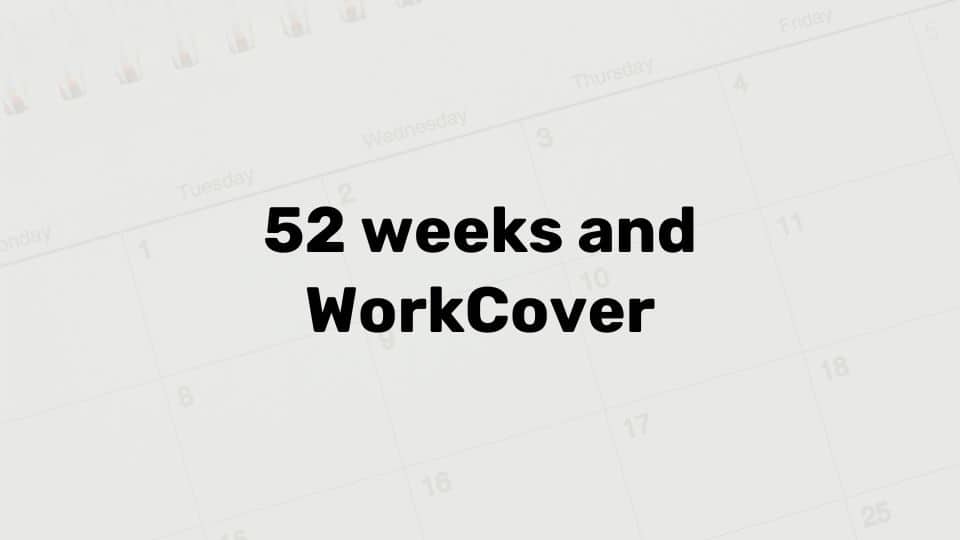WorkCover after 52 weeks
If you are on WorkCover payments, these may be reduced after 52 weeks if overtime and shift allowances were initially included in your pre-injury average weekly earnings (PIAWE) calculation.
Superannuation should begin to be paid to you by the WorkCover insurer after 52 weeks (if you were injured after 5 April 2010)
Additionally, the employer may no longer be required to offer you suitable duties. Unfortunately, in some cases this means that an employer may terminate your employment if you are not likely to be able to return to your pre-injury duties.
The rest of this page will explain the impact of hitting the 52 week mark when on WorkCover in further detail.
Table of Contents
Reduction in your weekly payments after 52 weeks
At 52 weeks, you may notice that your weekly payments are reduced if overtime and shift allowances were included in your initial pre-injury average weekly earnings calculation.
Your pre-injury average earnings are based on an average of your earnings taken over the 12 months that you’ve been employed, prior to the injury.
If you have not been employed for 12 months, then the average is taken over the period that you have been employed.
So if you’ve been employed for four months before you suffered an injury, it’s the average of four months of earnings.
For the first 52 weeks, any overtime and/or shift allowances that you worked before the injury over the relevant period are included in the calculation.
After 52 weeks however, if your WorkCover claim was made on her after 5 April 2010, then overtime and shift allowances will no longer be included in the calculation of your pre-injury average weekly earnings.
This means that in many instances, people will see a reduction in their weekly payments.
If your WorkCover claim was made before 5 April 2010, you’ll be entitled to have overtime and shift allowances included in your pre-average weekly earnings calculation for only 26 weeks rather than 52.
Once you hit the 52 week period, if you notice a reduction in your payments, and you disagree with the calculation of the insurer, then you have the option of lodging a request for conciliation.
Also, it is a good idea to double check and make sure that if you were working overtime or had shift allowances paid prior to suffering the injury that these were actually included in the calculation of your pre-injury average weekly earnings in the first place.
If they were not then you should contact the insurer and ask them to review your payments.
If you were entitled to have overtime on shift allowances included in your PIAWE and they were not included, then you are entitled to be back paid.
Superannuation paid by the insurer after 52 weeks
For the first 52 weeks that you receive WorkCover weekly payments, superannuation payments are not required to be made.
However, after 52 weeks you should start receiving superannuation payments in addition to any weekly payments that you are entitled to.
This means that if you are in receipt of weekly payments after 52 weeks, you should ensure that you are receiving superannuation payments. If you are not, then you should contact the insurer.
The insurer should, prior to the 52 week period, send you out a form relating to the payment of superannuation for you to fill out with your superannuation fund details.
Your job after 52 weeks on WorkCover
If you have an accepted WorkCover claim and your ability to work is impacted because of your work related injury, illness, or condition, such that you are not able to perform your pre-injury role, then employers are required to offer you suitable duties.
This requirement is for 52 weeks.
Say for example that you normally work on a production line doing manual work and you suffered injury to your shoulder.
As a consequence of that injury you are not able to perform your pre-injury role because of the lifting and manual work required.
The employer is required to offer you work that you are able to do, that is in accordance with medical opinion and the restrictions on your certificate of capacity.
This may, for example, involve you doing administration work or a supervisory role.
If there are no suitable duties then you’re entitled to be paid the full amount of weekly payments.
After 52 weeks, it is possible however for an employer to terminate your employment.
In order to be able to do so, they must be able to establish that from a medical point of view that you are not able to perform the inherent requirements of your pre-injury role.
What will usually happen is that an employer will request medical material addressing your ability to work.
They may arrange for you to see a doctor that they choose or they may write directly to your GP or other doctor that has treated you and knows your injury/illness/or condition.
The doctor will be asked in a general sense to answer whether you are able to perform your primary role, and if not, whether you might be able to do so in the future.
An employer has an obligation to consider any reasonable adjustments that might be able to be made to accommodate you given your injury/illness/condition.
You may be asked to attend a meeting where your work capacity and ability to perform your pre-injury role will be discussed.
The employer may notify you that they intend to terminate your employment because of your incapacity.
If you disagree with the decision to terminate your employment, you are able to lodge either an unfair dismissal application or depending upon the circumstances of the termination, you may be entitled to pursue a general protections claim via the Fair Work Commission.
These claims need to be lodged within 21 days from the date that the dismissal came into effect.
If you want to read more about termination whilst on WorkCover you can visit this page.
Conclusion
When you have a WorkCover claim, several things may occur at the 52 week mark.
Your WorkCover payments may be reduced if overtime or shift allowances were included in the original calculation of your pre injury average weekly earnings.
You should start getting paid superannuation payments if you are in receipt of WorkCover payments.
And finally, if your ability to work is impacted and you have been performing modified or suitable duties, the employer is usually no longer required after 52 weeks to offer you these duties. If you cannot return to your pre-injury role, it is possible that an employer may seek to terminate your employment.








